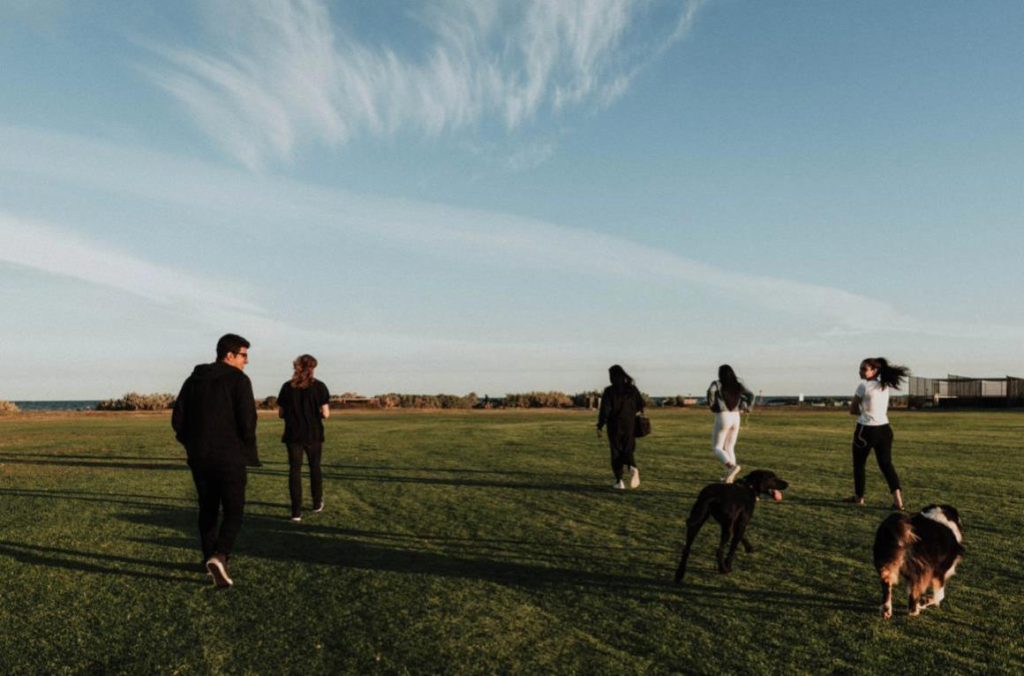One of the latest Internet jokes is to ‘touch grass’, which is originally an insult aimed at people that are constantly online and need to reconnect with reality. However, this may be actual advice for young people who have been more stressed and kept indoors in recent years.
During the past few years of the pandemic, habits of being online and staying indoors were thrust upon our society, with young people being at the epicentre of its consequences. Much of Generation Z (those born between 1997 and 2012) spent a large portion of their childhood and teenage years glued to phone screens and disconnected from in-person interactions and nature. According to a Frontiers in Public Health survey, 42% of them spend more than 6 hours per day on their mobile phones, and half of them feel anxious or stressed regularly. A majority of London teenagers are missing connections with nature, which would have provided wonderful ways to negate the stress digital lives can bring, despite 33% of the city being natural greenery and having 3000 parks spread across its urban landscape.
The Science Behind
Psychologist Dr Jamie Reuthrem is a strong supporter of exploring nature as a means to improve one’s health. She explains that spending time in green spaces can regulate one’s mood and facilitate calmness and mindfulness through the appreciation of natural scenery. “Most patients suffering from mental illnesses find walking around parks to be incredibly therapeutic and have reported improvements in their wellbeing such as decreased feelings of depression and anxiety,” Dr Reuthrem adds. Being more active outdoors can also benefit your physical health, such as lowering blood pressure and improving cognitive function.
Nature’s Therapy: Grass and Paws
Dr Reuthrem does not purely base her opinions on science, but also on her own experience with her child. Her 18-year-old daughter Ashley is part of a dog-walking volunteer group with some friends at her university, but she has not always been this active outdoors.
Like many teens her age, Ashley was impacted a lot by the sudden strike of the pandemic. With lockdowns and the need to adapt to online learning, she found it stressful to face her public exams on her own, especially due to the absence of in-person meetings with her friends. This took a toll on her mental health, and she was diagnosed with depression in 2021. There was very little change in her situation until she joined a volunteer group at her university.

Ashley’s university had an Animal Lovers’ Club which collaborated with the Royal Society for the Prevention of Cruelty to Animals (RSPCA), a renowned animal welfare organisation in the UK. She participated in one of their dog-walking sessions, in which the club members volunteered at one of the local RSPCA shelters to help their rescue dogs get some exercise. That experience gave Ashley an epiphany: she realised that she enjoyed the quiet company of her furry friends, but more importantly they encouraged her to go out to explore the greenery around her, and eventually fall in love with it.
“The first time I arrived at the dog park and went on a solo walk with one of the rescue dogs, I felt a wave of calmness come over me for the first time in a long time. It was as if all my worries were swept away by the wind, and I was left with only the endless grassy fields and appreciation for the beautiful scenery around me,” Ashley described. She explained that this was when she started attending more and more dog-walking sessions and eventually became a regular volunteer at the shelter. The walks were not only for the cute puppies, but herself. She felt like the time spent in nature allowed her to tackle the fast pace and constant bombardment of information and opinions online, which helped her get rid of her stress and low emotions. It also assisted her in aligning with her inner self and establishing peace within herself.
One of the other members of the volunteering crew also had a similar experience. “It was weirdly liberating,” Frederick Lam said. “I lived in Hong Kong most of my life and there wasn’t really a lot of green there. It was a hectic city and I was stressed constantly. I thought London would be no different but that’s when I discovered the capital’s abundance of green spaces and was finally able to relax and give myself an escape.” For those who live in urban cities, visiting greenery is a literal breath of fresh air. It allows them to escape the suffocating concrete jungles, remove their eyes from computer and smartphone screens, disconnect from technology and reconnect with nature.
Now Your Turn
The truth is, our generation is not opposed to exploring nature. In fact, Generation Z has been one of the most active generations in advocating for the environment and the protection of urban green places. However, it can be difficult to feel motivated to develop habits of walking around and smelling the flowers when for most of our lives, we’ve been accustomed to more indoor and online activities. This is why if you, like the Animal Lovers’ Club, also cannot withstand the irresistible charm of dogs, this is your calling to step out your door and reconnect yourself with nature.
Dogs, much like us humans, have been affected by the epidemic in recent years, with increasing cases of pet abandonment due to reckless pet purchases during the lockdowns, and lack of outdoor activities due to restrictions in public spaces. The RSPCA is organising a campaign in partnership with London Royal Parks – ‘Parks and Barks’. Dog-walking sessions and ‘Doggy Destress’ events will be held at Hyde Park, Richmond Park, St. James’ Park and Greenwich Park, every Saturday this May. The campaign hopes to encourage young people to visit the city’s green spaces, provide them with stress relief activities involving canines, and at the same time, raise awareness of pet abandonment and the importance of proper dog-walking. Young people can sign up for dog walks with RSPCA volunteers, who would provide education on dog-walking tips and the benefits of dog-walking for both human and dog. A large pen will also be set up in the fields for others who wish to just sit on the grass and play with the fluffy friends.

It is a fantastic opportunity to get in the sun and reestablish a connection with nature. So, if you are feeling stressed or anxious, instead of getting into a TikTok or Instagram rabbit hole as a form of escapism, consider this natural remedy. You may just catch Ashley and her friends helping out, or even be convinced to join them regularly!
(For more information on the ‘Parks and Barks’ Campaign, visit this page.)
